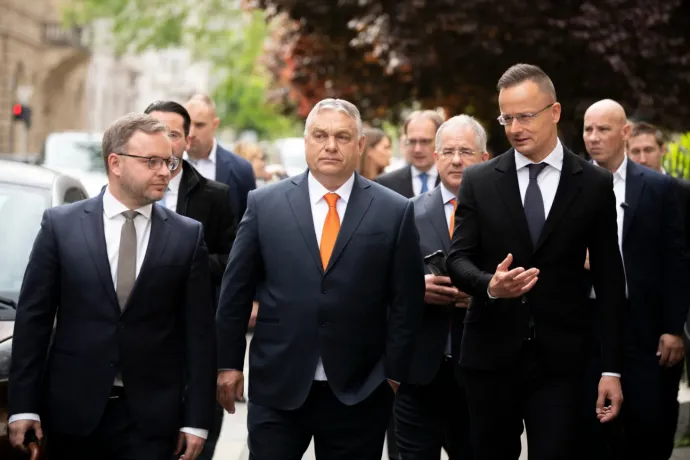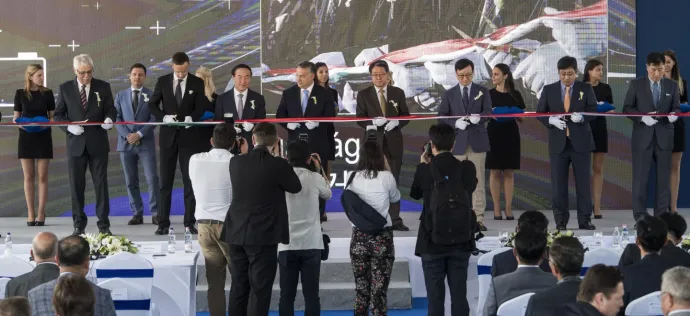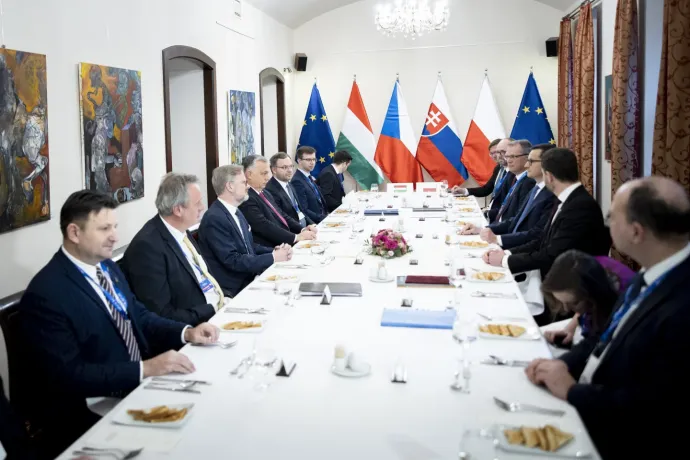Orbán promises to make Hungary a ‘regional middle power’ – and keeps us guessing about the hows

In contrast to most other European countries, Hungary has not published an official foreign policy strategy since 2011. For the lack of better options, observers have been trying to discern Hungary’s aims and motivations from Prime Minister Viktor Orbán’s speeches ever since.
The latest of these speeches – usually short on details and long on historical musings – was published in early January by Viktor Orbán’s chief of staff, Balázs Orbán (no family relation to the Prime Minister) on the website of Mandiner, a magazine run by Orbán loyalists.
According to the Orbáns, the “strategic challenge faced by Hungary is how to…become a developed economy and attain middle power status in Central Europe.” The main obstacle to achieving these aims is the “fragmentation of the international order,” the economic decoupling between the West and China, and the formation of closed economic blocs. “The return of the Cold War international order based on blocs would lead to a reduction in international trade and connectivity and would threaten to relegate Hungary to insignificance.”
In the PM's telling, unregulated ‘neoliberal’ globalisation led to the hollowing-out of Western industry, strengthened China, and in 2008 resulted in the crisis of the international order. In response, the West, led by the US, has been following a strategy of decoupling, whereby it increasingly breaks, weakens or regulates its connections with the rest of the world (or more precisely, China).
This threatens the reemergence of economic blocs, which runs counter to the interests of Hungary and similar small states. In such blocs, the centre controls the distribution of resources within the bloc, as well as the economic connections with the world outside the bloc. This would make smaller countries on the periphery of the bloc helpless, gravely exposed to economic risks without the ability to influence their position. (Curiously, the right-wing Orbán sounds strangely similar to the marxist dependency theories of world economy popular in the 1960s and 1970s.)
The solution, according to Orbán, is connectivity. Hungary should aim to foster as many connections with the world as possible, whether that be through trade, infrastructure, investment, knowledge transfer, or public diplomacy. The abundance of connections would ensure that Hungary would not be marginalised, and would retain its freedom to manage its relations without interference from the bloc’s centre.
Magical realism
This latest instalment follows a style typical of Orbán’s speeches: fairly mainstream ideas mixed with hints of science fiction, culminating in banal solutions – akin to the literary style of “magical realism”, which laces grimly realistic stories with elements of fairytales.
The slowdown of globalisation after the 2008 crisis, the social, political, and economic costs of the hollowing-out of Western industry and Asian offshoring, or the purported Western decoupling from China are discussed on a daily basis in the international financial press. The fact that these developments carry serious risks for the economic fortunes of open economies reliant on international trade and investment, such as Hungary, is widely understood.
Orbán’s diagnosis is hardly novel in this regard. In fact, numerous countries from Germany, and France, to South Korea, and Singapore are vying to remain connected to China, and are actively resisting US attempts at decoupling.
However, his realism devolves into science fiction when describing his vision for Hungary as a lone wolf escaping US-led Western decoupling, roaming freely outside the sphere of economic blocs, connected to all parts of the world.
While the Prime Minister has a tendency to lament the “decline of the West” and laud the “rise of the East” in world politics, he routinely glosses over the fact that Hungary owes the peace and modest prosperity of the last three decades to being a member of the ‘Western bloc’: NATO, and the European Union.
Although in 2011 Orbán’s government launched a so-called Eastern opening policy aimed at fostering trade and investment ties with East Asia, (first and foremost with China), a decade of economic diplomacy yielded modest results. Germany and other European partners remain the dominant destinations of Hungary’s trade and the dominant sources of its foreign direct investment.

A decade's worth of diplomacy aimed at cozying up to Russian President Vladimir Putin proved similarly unsuccessful. In early February 2022, weeks before the Russian invasion of Ukraine, Orbán signed a 15-year natural gas contract with Russia and declared that Hungary's energy supply was secured for the foreseeable future. A few months later, G7.hu, a business news portal calculated from the national accounts that the gas contract is indeed indexed to the European benchmark price, the Dutch TTF exchange. Hungary received no discount from Putin, and ultimately ended up in the same quagmire as any other European country after Russia sharply reduced natural gas deliveries to the continent.
The reliance on the EU became far too evident in 2022. The European Commission has frozen a significant portion of EU funding allocated to Hungary, alleging that Orbán’s government was dismantling the rule of law, weakening democratic checks, and balances and misusing EU funding. Since the money stopped flowing, Hungary has been facing a widening budget deficit, rising financing costs, and the rapid weakening of the forint, the Hungarian currency, vis-a-vis the euro, fuelling inflation – and prompting Orbán to promise dozens of legal reforms to the EU.
The Western dependence is similarly strong in defence. Since Russia’s invasion of Ukraine, Orbán has been justifying his Russia-friendly stance by stating that Hungary is protected by NATO, and as such, does not have to fear Moscow.
Costs, and clichés
Orbán’s qualm appears to be that membership in the Western ‘bloc’ comes with costs and obligations, as evidenced by his struggles with the European Commission. While providing defence for Europe, the US often interferes in European foreign and economic policies; in order to access the EU’s market and EU funding, Orbán has to temper his autocratic policies; when the US, Germany, and France decides that Russia must be sanctioned due to its aggression in Ukraine, Hungary has to play ball, even if that means rising natural gas prices.
In fact, the underlying theme of Orbán’s speech is that these costs and responsibilities are becoming excessive for Hungary, or more precisely, him and his Fidesz ruling party, whose attacks on the rule of law and political and civil liberties have come under increased scrutiny in Europe.
However, when RTL, a TV station, asked Orbán’s office if the Prime Minister’s words can be interpreted as him laying the groundwork for Hungary’s exit from the EU and NATO, the Prime Minister’s office replied that such assertions are “absurd and malicious”, as Hungary remains “a devoted member of NATO, and the EU and a believer in free trade“.
The Prime Minister does little to overcome the glaring contradiction between his vision for Hungary operating freely outside the Western ‘bloc’ – while staying a loyal member of the Western ‘bloc.’ It is also unclear how fostering ‘connectivity’ would prove to be more successful in the next decade than it was in the previous one: the modest returns of Asian and Russian diplomacy have shown the limits of such an approach.
His policy prescriptions for achieving ‘freedom’ are some of the most banal business clichés: facilitating inward foreign direct investment; building connections with the energy hubs of the region and the world; making the Hungarian banking sector a regional and global player; strengthening regional cooperation; higher education reform to foster knowledge exchange; developing industrial clusters in the arms industry, the IT sector, the food-, pharmaceutical- and auto industry; and help Hungarian companies become regional leaders.
In one way or another, such policies have been pursued by virtually every single emerging market in the world. It is hard to discern how these policy aims make Hungary special in any regard, or help Hungary achieve escaping the ‘Western bloc’ – especially as based on its fairly average economic performance in the past decade, Orbán does not appear to be the most skilled operator in the economic realm.
Regional middle power
Similarly curious is the aim to make Hungary a Central European “middle power”. This usually refers to states that hold a position in the international power spectrum well below that of a great power, but still have a sufficient ability to shape international events. Whether such a role is attainable for Hungary is highly questionable.
In the narrow sense of the word, the region of Central Europe consists of only eight countries: the so-called Visegrád Four of Hungary, Slovakia, Czechia, and Poland, plus Slovenia, Switzerland, Austria, and Germany. Germany is naturally the political and economic centre of the region, while only two other countries could reasonably aspire to be the “middle powers”: Poland due to its population of 38 million, and Austria due to being a highly advanced economy.
Hungary’s GDP is only one-fourth of Poland’s and one-third of Austria’s. Even Czechia and neighbouring Romania (which is usually not considered as a Central European country) boast an economy roughly one-and-a-half times that of Hungary’s.

It is also unclear what sort of political interests Hungary would pursue as a self-proclaimed ‘middle power.’ Orbán has been using his limited clout in the region for machinations which are hardly pertinent to Hungarian national interests. His allies were trying to prop up his Slovenian ally Janez Janša through Fidesz-linked investments in the Slovenian media, although the scheme has ultimately failed as Janša lost power earlier this year. In another scheme, Orbán has been financing Milorad Dodik, the radical leader of the Bosnian Serb Republic, who is formenting tension in the ethnically divided Balkans country.
Quite to the contrary of Orbán’s vision, Hungary’s regional clout has been waning as of late. In the second half of the previous decade, Orbán endeavoured to assume the driving seat of the Visegrád Four and use it as a vehicle to promote the common interests of smaller Central European vis-á-vis bigger powers in the EU. Recently, this scheme has been unravelling rather rapidly. Russia’s invasion of Ukraine and Orbán’s Russia-friendly attitude before and during the war has driven a wedge between Hungary and the rest of the group, and put V4 cooperation on the back burner.
Not the most gifted forecaster
Orbán is no stranger to bold claims about international politics. In perhaps his most widely-known speech in 2014, he declared that the future belongs to illiberal regimes such as Russia, China, and Turkey. These words ring less than wise in 2023: Russia has been destroying its military strength in Ukraine, tanking its economy in the process; Turkey has been battling self-inflicted financial malaise since 2018; and China’s growth has run out of steam as well.
It is also ironic that Orbán laments US-led decoupling, even though he was among the first foreign leaders to laud the election of Donald Trump – whose “America First'' policies culminated in a trade war with China, and thus played an outsized role in economic decoupling. While more level-headed analysts posited that Trump’s America First agenda threatened world trade and consequently, the economic interest of trade-reliant countries like Hungary, Orbán said that the former US President promised “great freedom” for Hungary, since he declared that “all nations have the right to put their own interest first”.
While a careless observer would assume that Orbán’s admiration of Trump has soured since, this could not be further from the truth: as recently as late 2022, Orbán doubled down on his support for the former President, and said that the war in Ukraine would not have broken out if Trump was still in the White House.
In other words, observers trying to discern a consistent strategy in Orbán’s proclamations are destined to be disappointed.
If you found this analysis useful, and don't want to miss similar ones in the future, subscribe to the Telex English newsletter!